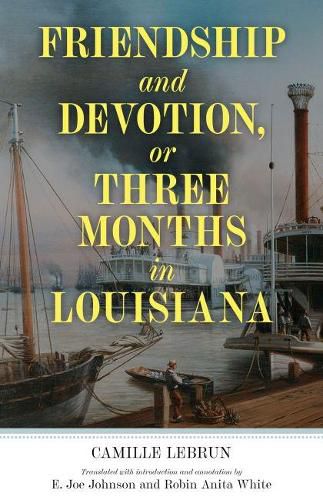Readings Newsletter
Become a Readings Member to make your shopping experience even easier.
Sign in or sign up for free!
You’re not far away from qualifying for FREE standard shipping within Australia
You’ve qualified for FREE standard shipping within Australia
The cart is loading…






This title is printed to order. This book may have been self-published. If so, we cannot guarantee the quality of the content. In the main most books will have gone through the editing process however some may not. We therefore suggest that you be aware of this before ordering this book. If in doubt check either the author or publisher’s details as we are unable to accept any returns unless they are faulty. Please contact us if you have any questions.
Parisian Pauline Guyot (1805-1886), who wrote under the nom de plume Camille Lebrun, published many novels, translations, collections of tales, and articles in French magazines of her day. Yet she has largely been forgotten by contemporary literary critics and readers. Among her works is a hitherto-untranslated 1845 French novel, Amitie et devouement, ou Trois mois a la Louisiane, or Friendship and Devotion, or Three Months in Louisiana, a moralizing, educational travelogue meant for a young adult readership of the time. Lebrun’s novel is one of the few perspectives we have by a mid-nineteenth-century French woman writer on the matters of slavery, abolition, race relations, and white supremacy in France’s former Louisiana colony.
E. Joe Johnson and Robin Anita White have recovered this work, providing a translation, an accessible introduction, extensive endnote annotations, and period illustrations. After a short preface meant to educate young readers about the geography, culture, and history of the southern reaches of the Louisiana Purchase, the novel tells the tale of two teenaged, orphaned Americans, Hortense Melvil and Valentine Arnold. The two young women, who characterize one another as sisters, have spent the majority of their lives in a Parisian boarding school and return to Louisiana to begin their adult lives. Almost immediately upon arrival in New Orleans, their close friendship faces existential threats: grave illness in the form of yellow fever, the prospect of marriage separating the two, and powerful discrimination in the form of racial prejudice and segregation.
$9.00 standard shipping within Australia
FREE standard shipping within Australia for orders over $100.00
Express & International shipping calculated at checkout
This title is printed to order. This book may have been self-published. If so, we cannot guarantee the quality of the content. In the main most books will have gone through the editing process however some may not. We therefore suggest that you be aware of this before ordering this book. If in doubt check either the author or publisher’s details as we are unable to accept any returns unless they are faulty. Please contact us if you have any questions.
Parisian Pauline Guyot (1805-1886), who wrote under the nom de plume Camille Lebrun, published many novels, translations, collections of tales, and articles in French magazines of her day. Yet she has largely been forgotten by contemporary literary critics and readers. Among her works is a hitherto-untranslated 1845 French novel, Amitie et devouement, ou Trois mois a la Louisiane, or Friendship and Devotion, or Three Months in Louisiana, a moralizing, educational travelogue meant for a young adult readership of the time. Lebrun’s novel is one of the few perspectives we have by a mid-nineteenth-century French woman writer on the matters of slavery, abolition, race relations, and white supremacy in France’s former Louisiana colony.
E. Joe Johnson and Robin Anita White have recovered this work, providing a translation, an accessible introduction, extensive endnote annotations, and period illustrations. After a short preface meant to educate young readers about the geography, culture, and history of the southern reaches of the Louisiana Purchase, the novel tells the tale of two teenaged, orphaned Americans, Hortense Melvil and Valentine Arnold. The two young women, who characterize one another as sisters, have spent the majority of their lives in a Parisian boarding school and return to Louisiana to begin their adult lives. Almost immediately upon arrival in New Orleans, their close friendship faces existential threats: grave illness in the form of yellow fever, the prospect of marriage separating the two, and powerful discrimination in the form of racial prejudice and segregation.